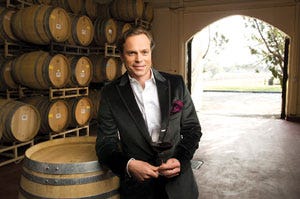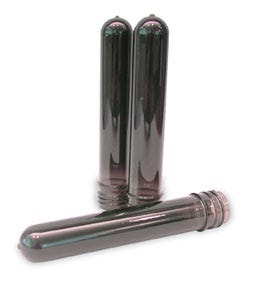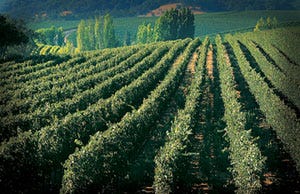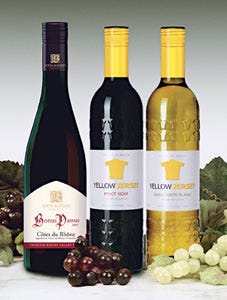January 30, 2014
|
Jean Charles Boisset may look like a classic French vineyard owner, but he takes a nontraditional approach to packaging for his family's wines. Below, left are preforms that can be blowmolded into PET bottles that Boisset Family Estates now uses to improve the sustainability of their wine packaging. |
Jean Charles Boisset could be considered a bit of a maverick. As president of Boisset Family Estates, which has wineries in France, Italy and California, he is a fervent believer in packaging with sustainable characteristics.
In fact, in a bold move, Boisset recently announced that his company will use lightweight PET bottles for all of its Beaujolais Nouveau wines imported to North America from the company's wineries of Mommessin and Bouchard Aîné in France.
The annual release of Beaujolais Nouveaux is a major event in the wine world. Each year, more than one-million cases of the new Beaujolais are shipped around the world for release at 12:01 a.m. on the third Thursday of each November. It is reported that nearly half of the Beaujolais total annual production is distributed and consumed within 24 hours of its release.
|
Boisset explains that his family's business made the move to PET bottles from traditional glass bottles to become more sustainable.
The lightweight, blow-molded PET bottles made by Constar Intl. (www.constar.net) utilize the MonOxbar Plus™ oxygen-scavenging technology that extends wine's shelf life while allowing it to “breathe.” Boisset says the biggest benefit of PET is that it dramatically reduces the weight of the bottles. Now, he says, Boisett can ship 1,750 cases of the Beaujolais in a container instead of only 1,000 cases of glass bottles. This is especially important, Boisset explains, because the Beaujolais Nouveau must be shipped by air to meet tight deadlines for its distribution.
This isn't the first time Boisset Family Estates has turned to PET bottles. Recently, the company also began offering its Louis Bernard Bonus Passus Côte du Rhône in a specially designed Constar PET bottle, which is similar to the traditional shape of Burgundy glass bottles. This is the first time a prestigious French AOC (appellation origine controllé) wine is offered in this alternative type of packaging. In addition, the company has already released in North America its Yellow Jersey wines in a PET bottle with T-shirts incorporated into the bottle design.
“Many people think we're crazy,” Boisset says. “However, due to the fact that we have so many premium wineries, people respect us and trust us on the quality of the wines, which have been very highly rated.” He points out that PET bottles should only be used with wines that are expected to be consumed within two years. Wines whose flavor and value improve over years of aging still are best bottled in glass, Boissett says.
As wine commentator Eric Arnold recently wrote in Forbes magazine, “Glass—despite being [relatively] cheap, easy to produce and easy to recycle—is very heavy and racks up carbon-emission counts during transportation. He quoted a study by the American Association of Wine Economists that said the production and distribution of wine is responsible for roughly 6.3 billion tons of greenhouse gas emissions, or nearly one percent of global emissions annually.
|
“I have a very strong belief that through a consumer product, you can communicate a very powerful message to the world,” Boisset says. “We are very lucky to have a beautiful product in wine. It's cultural, traditional and has a strong sense of identity. It offers a great way to demonstrate to the world what can be done in sustainability and to explain how we can make the world a better place.”
Eye-opening experience
Boisset recalls his initial visit to the U.S. 25 years ago, during which he first saw mustard in plastic bottles. “In France, we had only known mustard in pottery jars,” he says. “I had never seen it being squeezed out by hand. I thought this was brilliant.”
He attributes his interest in the environment to his grandmother, a school teacher, who initiated in him a very strong footprint of nature, organic farming and biodynamics.
PET bottles aren't the first measure Boisset Family Estates has taken to improve the sustainability of its products. First, it worked to ensure its vineyards were organically certified and improved the environmental aspects of its winemaking operations.
Boisett says that after studying the supply chain, the obvious opportunities were in packaging, where the company could minimize its carbon footprint, packaging weight and waste volume, while reducing the waste flow to landfills.
Earlier, the company had begun bottling its French Rabbitt wines in Tetra Pak (www.tetrapak.com) aseptic containers, which has proven very successful. Boisett pointed out that Tetra Pak containers account for only four percent of the finished product's weight while a glass bottle could represent as much as 40 percent of the weight. In addition, the company has presented its Mommessin Beaujolais Grand Reserve in a bottle-shaped aluminum can, imprinted with a dot that changes color when the wine reaches its ideal temperature. The cans were manufactured by Alcan Packaging (www.alcanpackaging.com).
“The more people understand the cost of oil, the cost of energy, the cost of everything, the more people realize our efforts should be put into the quality of the wine rather than into the package itself,” Boisett says.
Following the 70-percent rule
He adds that the business is governed by the “70-percent rule,” which means 70 percent of the world drinks wine that costs less than $15 a bottle, 70 percent consume the wine within three hours of buying it, and 70 percent of the production costs are created by packaging and merchandising rather than the winemaking itself.
|
|
PET bottles with Constar's MonOxbar Plus oxygen-scavenger technology are recyclable with the 1-PET code and have a favorable carbon footprint. Boissett says that life cycle analysis shows that the production of 750-mL wine bottles generates approximately 50 percent fewer greenhouse gases than the production of 750-mL wine bottles in virgin glass.
Constar's approach to manufacturing also helps to reduce transportation, as the PET preforms are made at its plant in Sherburn, U.K., and are then shipped to Manypack in France for blow molding into bottles. The bottles are then filled at the Louis Bernard Winery.
Proximity offers a bonus
The ability to produce the bottles in close proximity to where the wine is made and filled reduces environmental impact and cost of transportation. Boisset says Constar was key in supplying a truly sustainable solution using PET that also protects the subtle nuances of exceptional French wine. “We have an intimacy with our wines that is unique to centuries-old family vineyards,” he says. “Each is lovingly cared for from grapes to glass, ensuring a quality we are proud to call our own. In Constar's MonOxbar Plus oxygen-scavenger technology, we have found packaging that adds an additional dimension to PET technology that was an essential evolution to complement the heritage of our wines, the palates of our customers and our commitment to sustainable, eco-friendly business practices.”
Boisett's U.S. introduction of the AOC Bonus Passus Côte du Rhône and Yellow Jersey Pinot Noir and Sauvignon Blanc wines comes on the heels of last year's successful launch of Yellow Jersey wines in Canada, which also employed Constar's MonOxbar. It was the first 750-mL PET wine bottle to be manufactured and filled in North America.
|
With its 2008 release, Boisett Family Estates will introduce use of the PET Bottle for its Beaujolais Nouveau imported from France |
Constar marketing director Alex Fioravanti says the U.S. launch of French wines in PET bottles is a major win for Boisset Family Estates and for Constar. “Communities, retailers and consumers are demanding more sustainable, eco-friendly packaging options, whether for everyday items or higher-end purchases like wine. For some products, the barrier to conversion has been package performance. 'Can I give consumers a green package without sacrificing the quality and integrity of my product?' is a question that's often asked. With Constar's MonOxbar Plus oxygen-scavenger technology for PET, we're able to deliver performance and sustainability to Boisset Family Estates, allowing them to satisfy the growing desire for sustainable packaging among wine consumers.”
Fioravanti says that because MonOxbar Plus is blended into PET and then blow-molded into monolayer bottles, it offers tremendous design flexibility. In the case of Boisset Family Estates, the material is easily blow-molded into the recognizable Burgundy and claret shapes and the custom-bradded surface of the Yellow Jersey varietals, which features a pattern of jerseys reminiscent of the leaders' colors in the Tour de France bicycle race.
“Monolayer PET structures are robust on filling lines and indistribution; there is no risk of delamination that you see with multilayer containers,” Fioravanti says. “This is an added benefit for Boisset Family Estates, as it is filling the bottles in its home country of France and then shipping to the United States for distribution.”
Constar says that its expertise and proprietary functional design features enable PET bottles to be filled on the same equipment as glass bottles, with minor modifications. It says this ability to supply PET bottles that do not require expensive or time-consuming modifications to customers' existing glass-bottle filling lines adds value for wineries seeking to use PET bottles in their product mix. Constar also offers MonOxbar preforms to customers who operate their own blow-molding machines or aseptic fillers running integrated blow/fill lines. MonOxbar's oxygen barrier is embodied in the preform, which is less expensive to ship than than bottles.
|
Mike Hoffman, Constar's President and CEO, comments, “MonOxbar represents a revolutionary development in oxygen barrier technology. We believe that MonOxbar is by far the industry's most effective oxygen barrier technology, and since it is a PET resin blend, it can be manufactured on practically all of our existing PET bottle-making machinery with only minor investments in specialized equipment. We are very excited to have such an economical and highly-effective oxygen barrier solution available for applications that expand PET's reach.”
The Boisset Family Estate wines in PET bottles also employ Stelvin screw caps, manufactured by Alcan Packaging. These long-skirted, metal caps are gaining increasing favor in the wine industry. Inside each cap is a tin layer covered by a neutral polyvinylidene chloride (PVDC), which is in direct contact with the wine.
The caps can prevent the problem of “cork taint,” which can impart a moldy flavor into wines and cause considerable variation in taste, even among bottles packaged into the same case.
“It is critical today, with the scarcity of our plantet's resources and the known environmental impacts of human activity, that we consider whether we should still ship thousands of cases of wine in heavy bottles by air throughout the world, when we can cut fuel use and greenhouse gas emissions by more than half through a responsible choice of packaging,” Boisset says.
More information is available: |
Constar Intl., Inc., 215/552-3700. www.constar.net. |
Alcan Packaging, 773/399-8000. www.alcanpackagingfood.com. |
Tetra Pak, 847/955-6000. www.tetrapak.com. |
About the Author(s)
You May Also Like








